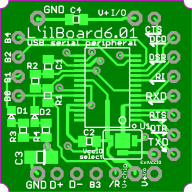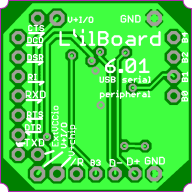USB serial peripheral Li'lBoard page.
Model number: LB6.01.
Description: The L'ilboard version of the FTDI FT232R chip, without a USB connector. One of the smallest and most versatile implementations around. Either a normal or a mini USB B style connector can be added by attaching a L'il7.13 or L'il7.14.
Applications: Add a USB connection to just about any circuit. The FT232R, along with FTDI-supplied drivers, can do more than supply an RS-232 connection (which it can do quite speedily, up to 3Mbaud). As well, it has 5 generic I/O pins; it can provide a clock signal to your circuit (6/12/24 or 48 MHz); and it can operate USB-powered or in a self powered peripheral.
Features: Many companies have designed little USB boards with the FTDI chips. This one, however, is one of the most versatile since all of the chip's I/O pins are available to the user, and all power modes (self powered, USB powered, and USB-powered with load switching) are available. In conjunction with other L'ilboards and with the FTDI drivers, a lot of versatility is represented by this one module.
Separation of Vccio is made possible via a 3-way solder blob connection: it can be connected to the chip's Vcc, an external pin, or the 3.3 V generated on-chip.
Key components: FT232R (in SSOP-28 package)
Restrictions:
•This L'ilboard does not have duplicate power and ground connections if it is connected normally to one of the optional connector boards. The main power connection, which is labelled “V+I/O” can either be an input when the board is powered by your system's supply, or an output if the board is used in a system that receives power from the USbus.
Images:


Vin max: 5.0
Vin min: 3.3
SPI: No (is RS-232 and USB)
Tenth centers: YES. The connections to the USB connector (which will typically will be a L'il7.13 or 7.14) are on an edge which is not compatible with solderless strips, however.

